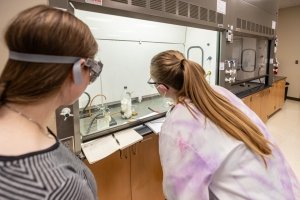
Chemical Physics
Unravel molecular behavior through chemistry and physics as the Chemical Physics major prepares you for careers in research or academia.
Overview
The Chemical Physics Program offers students interested in physics, chemistry, and materials science a strong theoretical foundation in these interrelated fields. You’ll learn both theory and experimental techniques and become proficient in the communication of scientific information. A degree in chemical physics provides opportunities for careers in material science, physical chemistry, and physics. Centre chemical physics majors have also been admitted into top graduate research programs.
Curriculum
Chemical physics majors take core math, chemistry, and physics courses (at the first-year and sophomore levels), as well as courses in advanced physics and physical chemistry. You will then choose advanced courses to pursue areas aligned with your interests (e.g., optics, quantum mechanics, inorganic chemistry).








